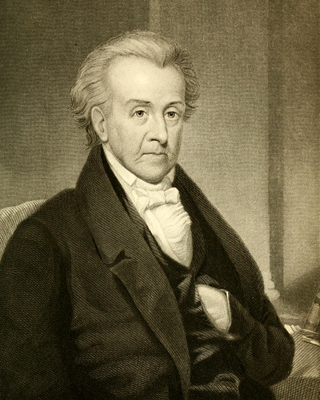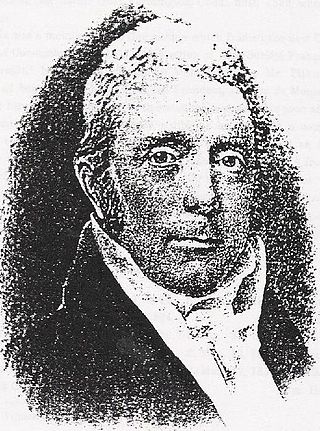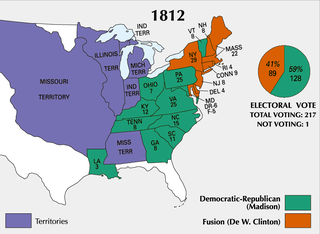
Elizur Goodrich was an eighteenth-century American lawyer and politician from Connecticut. He served as a United States representative from Connecticut and Collector of Customs. He was also the brother of US Senator Chauncey Goodrich, son-in-law of Founding Father Oliver Wolcott.

Chauncey Goodrich was an American lawyer and politician from Connecticut who represented that state in the United States Congress as both a senator and a representative.

Calvin Willey was an American politician from Connecticut who served in the United States Senate from 1825 to 1831.

John Cotton Smith was an American lawyer, judge and politician from Connecticut. He served as a member of the United States House of Representatives, as the 27th Lieutenant Governor of Connecticut and as the 23rd Governor of Connecticut.

The 1812–13 United States House of Representatives elections were held on various dates in various states between August 3, 1812, and April 30, 1813. Each state set its own date for its elections to the House of Representatives before the first session of the 13th United States Congress convened on May 24, 1813. They coincided with James Madison being re-elected president.
Roger Griswold was a lawyer, politician and judge from Connecticut. He served as a member of the United States House of Representatives, judge of the Connecticut Supreme Court and the 22nd governor of Connecticut, serving as a Federalist.

Samuel Whittlesey Dana was an American lawyer and politician from Middletown, Connecticut. He represented Connecticut in both the U.S. House of Representatives and Senate.

Opposition to the War of 1812 was widespread in the United States, especially in New England. Many New Englanders opposed the conflict on political, economic, and religious grounds. When the Embargo Act of 1807 failed to remedy the situation with the United Kingdom, with Britain refusing to rescind the Orders in Council (1807) and the French continuing their decrees, certain Democratic-Republicans known as war hawks felt compelled to persuade the United States government to declare war on the British. A number of contemporaries called it, "The second war for independence." Henry Clay and John Calhoun pushed a declaration of war through Congress, stressing the need to uphold American honor and independence. Speaking of the impact of the depressed cotton trade upon his fellow Southerners, Calhoun told Congress that:

Josiah Stoddard Johnston was an American politician who served as both United States representative and Senator for Louisiana. Born in Salisbury, Connecticut, he moved with his father to Kentucky in 1788, and went to Connecticut to attend primary school. He graduated from Transylvania University in 1802, studied law, was admitted to the bar, and commenced practice in Alexandria, Louisiana. He was a member of the Territorial legislature from 1805 to 1812 and during the War of 1812 raised and organized a regiment for the defense of New Orleans, but reached the city after the battle. He engaged in agricultural pursuits and was a State district judge from 1812 to 1821.

John Allen was an eighteenth-century lawyer and politician. He served as a United States representative from Connecticut and as a member of the Connecticut Supreme Court of Errors.

Robert Bernard Hall was a member of the United States House of Representatives from Massachusetts. He was born in Boston on January 28, 1812. He entered the Boston Latin School, studied theology at Yale Divinity School in New Haven, Connecticut where he graduated in 1835, and was ordained to the ministry, first as a Congregationalist and then as an Episcopalian. Hall was one of the twelve original members of Garrison’s Anti-Slavery Society.

Elisha Phelps was a United States representative from Connecticut. He was the son of Noah Phelps and father of John Smith Phelps who was a United States Representative from Missouri. He was born in Simsbury, Connecticut. In 1800, he was graduated from Yale College and from Litchfield Law School. He was admitted to the bar in 1803 and began practice in Simsbury.

Benjamin Tappan was a United States district judge of the United States District Court for the District of Ohio and a United States senator from Ohio.

The following is a partial list of events from the year 1812 in the United States. After years of increasing tensions, the United States declares war on the British Empire, starting the War of 1812.
Massachusetts gained three seats after the 1810 census, all of which were added to the District of Maine. Its elections were held November 5, 1812, but since Massachusetts law required a majority for election, which was not met in the 19th district, a second ballot was held there January 6, 1813.

Louisiana held its first United States House of Representatives elections following its April 1812 admission to the Union on September 28–30, 1812. A special election for a seat in the 12th Congress and a general election for a seat in the 13th Congress were held at the same time, and had nearly-identical results.

Maryland's apportionment was unchanged. It elected its members October 12, 1812.

The 1812 United States presidential election in Connecticut took place between October 30 and December 2, 1812, as part of the 1812 United States presidential election. The state legislature chose nine representatives, or electors to the Electoral College, who voted for President and Vice President.

The 1813 Connecticut gubernatorial election took place on April 12, 1813.

The 1812 Connecticut gubernatorial election took place on April 13, 1812.
This page is based on this
Wikipedia article Text is available under the
CC BY-SA 4.0 license; additional terms may apply.
Images, videos and audio are available under their respective licenses.

















